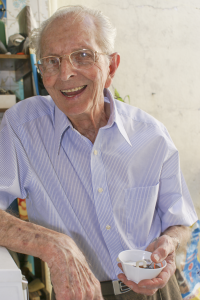June 24, 2014
 As we ease into summer, we all want to get outside, enjoy the beautiful weather and maybe even do a little home improvement work. For elderly individuals, home improvements and modifications that make the home safer are important as an effort to prevent dangerous falls and make the home more accessible. June is National Home Safety Month and it’s a great time to consider how you can help an elderly family member, friend, or neighbor create a safer home for maximum independence and well-being. The Society of Certified Senior Advisors makes the following suggestions for general home safety:
As we ease into summer, we all want to get outside, enjoy the beautiful weather and maybe even do a little home improvement work. For elderly individuals, home improvements and modifications that make the home safer are important as an effort to prevent dangerous falls and make the home more accessible. June is National Home Safety Month and it’s a great time to consider how you can help an elderly family member, friend, or neighbor create a safer home for maximum independence and well-being. The Society of Certified Senior Advisors makes the following suggestions for general home safety:
- Post all emergency numbers near the phone or on the refrigerator, i.e. emergency contacts, doctors, poison control.
- Place frequently used items within reach and off of high shelves.
- Remove potential tripping hazards: electric cords, low lying furniture, area rugs, loose carpet.
- Inspect walkways and driveways and repair any problem areas.
- Install ramps outside and inside the home where necessary for wheelchairs.
- Even out differences in floor heights from room to room by installing beveled thresholds.
- Check that footwear worn in the home has non-skid soles and is in good condition.
- Install or inspect smoke alarms to assure proper functioning.
- Check that small appliances are working properly and are in good condition, e.g., toaster, blender, coffee maker, microwave, space heaters, etc.
- Dispose of flammable liquids, e.g., paint, gasoline, etc.
- Remove clutter from main traffic areas.
- Inspect handrails for proper, secure installation to ensure they can support appropriate weight.
- Position furniture to allow plenty of space for walking. Remove furniture if needed.
- Don’t use chairs with rollers on the legs.
- Replace handles on doors, cabinets, and furniture to make grasping them easier.
- Check stairways for safety: treads that are secure, carpeting that is not loose or worn, even heights of risers, take care of any protruding nails, get rid of clutter stored on steps, secure handrails, etc.
What happens if a fall occurs? Is there anyone else in the home who can help? If not, an emergency medical response system is the perfect solution. Contact us for more information about the monitoring products available or to discuss options for private duty home care.
